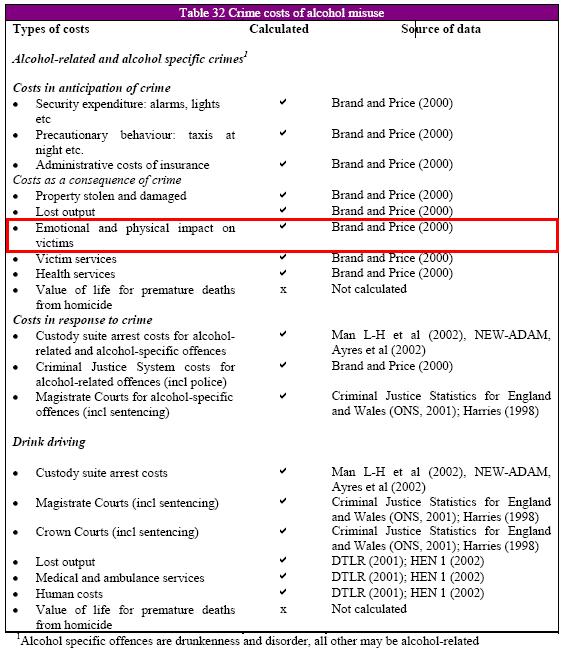How do you measure the 'emotional costs' of alcohol abuse?
The Prime Minister claimed last week that £21 billion is lost to alcohol abuse each year - a figure derived from a Cabinet Office report from 2003 and updated in part with more recent health and crime costs.
We were concerned not only because the figures were out of date, but because of some of the categories used to make the estimate. The biggest slice of the cost - £4.7 billion - was attributed to "emotional impact costs for victims of crime".
So what exactly does this mean?
£12 billion of the £21 billion cost of alcohol abuse is attributed to 'crime costs'. The sources for these estimates are provided in the 2003 report:
Join 72,953 people who trust us to check the facts
Sign up to get weekly updates on politics, immigration, health and more.
Subscribe to weekly email newsletters from Full Fact for updates on politics, immigration, health and more. Our fact checks are free to read but not to produce, so you will also get occasional emails about fundraising and other ways you can help. You can unsubscribe at any time. For more information about how we use your data see our Privacy Policy.

The emotional and physical impact of victims data is attributed to Home Office Research Study 217 from 2000, which looks into the "economic and social costs of crime".
The study begins by defining exactly what is meant by emotional impacts. It gives examples:
"For example, the victim of a robbery may have received physical injuries (bruises, cuts), they may feel shocked, insecure, distrustful and vulnerable for many weeks or months afterwards, and may be unable to sleep properly. Victims of property or personal crimes may suffer a feeling of violation. This physical or emotional impact, especially for violent and sexual offences, generally far outweighs any financial costs."
In order to get to monetary costs of these impacts, the research uses surveys from victims of crime. The method is described:
"Emotional and physical impacts of crime are, for the time being, estimated using figures for people's willingness to pay to avoid road traffic accidents"
In essence, this is an attempt at measuring how much a person values avoiding accidents. The research applies this survey data to estimate the emotional and physical impact of 'violent crime'. This is in turn extrapolated to apply to alcohol-related crime in general.
The research concedes that "better estimates" are needed for the measurement of emotional impact. In addition, the authors recognise these are far from ideal to apply to violent crime because, obviously, the circumstances of violent crimes in general can substantially differ from those of road traffic accidents.
The Home Office research estimates the total cost of crime to England and Wales in 1999/00 was £60 billion. £18 billion of this total was attributed to the emotional and physical impact on victims of crime.
The research does not, however, provide any details as to how much of this is attributable to alcohol, and claim this is based on an extrapolation by the Cabinet Office of the Home Office data.
So the £4.7 billion 'emotional impact cost' of alcohol abuse to the UK is fundamentally founded in surveys given to victims of road traffic accidents over 13 years ago, asking how much they would spend to avoid being in future accidents. This is then applied to violent crime in general, and then further applied to alcohol-related crime. Make of that what you will.